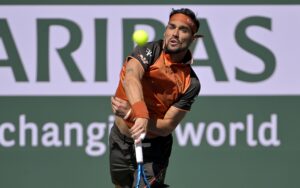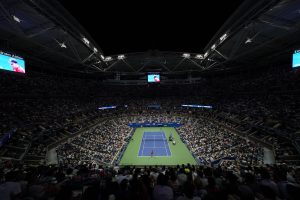Amid all the celebrations that accompanied Roger Federer’s win in Rotterdam last weekend, which confirmed that he had become the oldest world No.1 since the ATP rankings began in 1973, it was easy to forget the man on the other side of the net. That man was Grigor Dimitrov, who, more than anyone else, must be wondering when Federer will finally retire and allow him to emerge from the giant shadow that the Swiss has cast upon him.
Of course, most current players, with the exception of Nadal and Djokovic, feel that they have been overshadowed to some extent by the feats of Roger Federer. However, with Dimitrov the comparison is more personal, more pointed, precisely because of the unfortunate nickname that was bestowed upon him early in his career – “BabyFed”. It was initially meant to be flattering, in recognition of his possessing a truly all-court game that bore comparison even with that of the Swiss master. However, the longer that Dimitrov goes without winning a Major, the more that apparently innocent nickname becomes a hindrance, or even a millstone around his neck.
It must be acknowledged that Dimitrov is hardly doing badly. He is currently ranked No.4 in the world and until recently had been No.3, behind only Federer and Nadal. It was only Marin Cilic’s recent rise up the rankings, after reaching the Australian Open Final, that pushed him down a place. So, he was briefly the most famous “Third Man” since Harry Lime, after ending a largely successful 2017 by winning the biggest title of his career, the ATP World Tour Finals at the O2 in London.
As a result of that win, Dimitrov had appeared perfectly primed to take 2018 by storm, finally proving – to himself, as much as to the world – that he could translate his undoubted talent into Grand Slam glory. At the very least, it was hoped that he would match his 2017 performance in Melbourne, when he only narrowly lost a classic five-set semi-final to Nadal, in a match that many tennis writers thought was the best of the year.
Of course, hope rarely matches expectation and that is exactly what has happened to Dimitrov at the start of 2018. After looking so good in the early rounds in Melbourne, especially when he defeated home favourite Nick Kyrgios in four hard-fought sets (including three tie-breakers) in the fourth round, he was comfortably the favourite for his quarter-final against Britain’s Kyle Edmund. Edmund was in the second week of a Slam for the first time in his career, but ultimately it was Dimitrov who ended up looking like the inexperienced ingénue, as Edmund’s fearsome forehand blasted him off court.
It was a similar story in Rotterdam last week. Dimitrov did extremely well to reach the final, but then succumbed rather meekly to Federer (6-2, 6-2), to give him a thoroughly unmagnificent 7-0 losing record against the Swiss. He is certainly not alone in having a losing record against Federer; again, with the exception of Nadal and Djokovic, most current players do. However, such was the relative poverty of his performance in Rotterdam that he and everyone else must wonder whether he will ever beat Federer.
In that respect, Dimitrov is at the vanguard of what threatens to be a “lost generation” of male tennis players, at least as far as the Majors are concerned. As with Kei Nishikori and Milos Raonic, to name but two, Dimitrov is now in the second half of his twenties and yet he is still continually being confronted by the apparently immovable obstacles of the ATP’s “Big Three” – Federer, Nadal and Djokovic. While it might have been reasonably expected that at least one of them would have retired by now, the exact opposite has happened. Indeed, Federer, enjoying a late-period Renaissance comparable to that of David Bowie, is still showing signs of improvement, particularly with his completely rebuilt backhand. Again, that reflects poorly on Dimitrov, who, despite being a decade younger than Federer, has not shown the same kind of improvement in recent years, to the point that his own one-handed backhand now looks relatively flimsy in comparison with that of the Swiss.
The way things are going at the moment, with Federer in particular showing all the signs that he will continue playing until the Tokyo Olympics in 2020 (at least!), there is something of a logjam at the top of the men’s rankings. It may only be removed when Federer, Nadal and Djokovic eventually retire, whenever that is, and it may be that as a result the likes of Dimitrov, Nishikori and Raonic will never get to win a Major. Instead, the Grand Slams may “skip” a generation, as it were, with younger players in their early twenties, such as Alexander Zverev, Borna Ćorić and (dare we Britons dream?) Kyle Edmund, being in pole position to take over from Federer et al when they retire, leaving their slightly older peers, such as Dimitrov, high, dry and Grand Slam-shy.
We are not at that point yet and it may just be that the passage of time achieves what nothing else can, and makes Dimitrov redouble his effort to become a Major champion. But with each passing year, that inevitably becomes more difficult, especially when the man you are nicknamed after is enjoying such a remarkable late phase of his career.
Right now, “GrandpaFed” (as he will hate being called) remains way ahead of “BabyFed”. And incidentally, it may just be that Dimitrov’s nickname, however unwanted, provides a clue to his relative failure. Initially, it was just applied to differentiate him from Federer, who is a decade older than him. However, like the best nicknames (even unwanted ones), “BabyFed” may just have stuck to Dimitrov because it hints at a deeper, darker truth.
As William Skidelsky points out time and again in his sublime book on Federer, “Federer and Me”, for all of Federer’s extraordinary physical attributes – his cat-like movement, his deceptive power and his relative resistance to injury – perhaps his greatest, even defining, characteristic is his mental strength. For several years (roughly between 2013 and 2016, when he didn’t win a Major), it was feared that that mental strength – that sheer ability to focus and concentrate on the point and moment in hand, until the end of the match – had deserted Federer. Now, since his remarkable win in Melbourne last year, it appears stronger than ever. And it is that quality, more than any other, that Dimitrov must cultivate if he is not to be forever condemned as a mere “BabyFed”.





